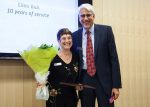Jewish Family Service Agency chief executive officer Richard Fruchter with Ellen Bick, recognizing the work of JFSA staff at the agency’s Nov. 30 annual general meeting. (photo from JFSA)
Richard Fruchter is the new chief executive officer of the Jewish Family Service Agency (JFSA). He barely had time to settle into the agency’s former location before its move to East Broadway, adjacent to Vancouver Aboriginal Child and Family Services Society. As Fruchter cheerfully leads an office tour, he has clearly settled into his role, proud of the new space, the agency’s staff and their work.
Fruchter is excited to expand the agency’s activities and profile in the Jewish community and beyond, as well as to take it in some new directions required by changing times.
“It’s inevitable now because of the generational shift that there is going to be more need for home support,” said Fruchter, citing one example. “That particular area of service is growing by more than 10% a year. We now have more than 80 home support workers. They go out into all neighbourhoods in the community. We also work with the Better at Home program with United Way, working in the broader community. That’s another potential growth area for us that we have to prepare for.”
Fruchter said JFSA’s activities in the Jewish community are more urgently needed with each passing month.
“What we’re seeing is that there is a tremendous need for food and housing,” he explained. “These are two areas where there is an affordability crisis for our community just like the rest of the community; we’re seeing astounding growth in those two areas on a month-to-month basis. When it comes to food security, we’re seeing growth all across the board – certainly with seniors, but we’re also seeing more families, it used to be mostly individuals. We see people coming to the [Jewish] Food Bank twice a month instead of once. The demand for food vouchers has grown by over 20% this year.”
He added, “If housing is getting more and more expensive for people, they begin making choices between rent and food or medicine, and we don’t want people making those kinds of choices. Those needs tend to tumble into each other, and people end up needing more and more services.
“The advantage that we have as an agency is that we have this remarkable basket of services, so that if someone is food insecure, sometimes they’re also housing insecure. If they are a new immigrant, they may need employment opportunities, they may need a hand-up for a couple of months in transitional housing.”
Another mounting issue, said Fruchter, is the growing needs of aging Holocaust survivors. “We are seeing that many survivors are beginning to need support, or more support,” he said.
“People are not cognizant enough of the presence of poverty in the Jewish community,” he continued. “We plan to partner with CIJA [Centre for Israel and Jewish Affairs] to do unprecedented advocacy both within the Jewish community and with the government – federal, municipal and provincial – to show what an important cog we are in helping people to be more resilient and able to deal with the crises in their lives. I am looking forward to working more closely with our partner agencies and our synagogues to make sure no one slips through the cracks.”
As for the role JFSA plays in the broader Vancouver community, Fruchter explained, “Most of the services we do are in the Jewish community, but if you go back to our values, when our sages said, ‘welcome the stranger,’ they didn’t mean the Jewish stranger. They meant, ‘welcome the stranger’! If we find that people are in need, we’re going to go out there and help them. The main areas are employment, settlement and the Better at Home program, which is for lower-income seniors who need a little help to stay in their homes. The United Way came to us and said we love what you’re doing, we wonder if you could replicate that in the broader community.”
Fruchter came to service work in the Jewish community after a background in journalism, communications and social services. His work with the Jewish Federation of Greater Seattle was pivotal. “I just grew into that job and loved what I did, and my Jewish identity blossomed from the work I was doing,” he said.
Fruchter worked for federations in Arizona and Minneapolis before heading to Seattle. He first came to Vancouver as a senior management consultant two years ago for the Jewish Federation of Greater Vancouver, after being president and CEO of the Seattle Federation for six-and-a-half years. “I got a call from Mark Gurvis, an old pal in the Jewish communal services field, saying he was moving to New York and had a proposition for me. I got the interim job, then went home. Later, I got a call from JFSA wanting consulting, and that progressed to a job offer. I was inspired by what I was seeing and the potential of the organization, so I accepted.”
Fruchter’s wife and three sons still live in Seattle, while he commutes to Vancouver every Monday.
“I love the community here,” he said. “It is very strong, very intergenerational, very committed. The agencies work well together, the rabbis work well together, which is not the case everywhere.”
Matthew Gindin is a freelance journalist, writer and lecturer. He writes regularly for the Forward and All That Is Interesting, and has been published in Religion Dispatches, Situate Magazine, Tikkun and elsewhere. He can be found on Medium and Twitter.

